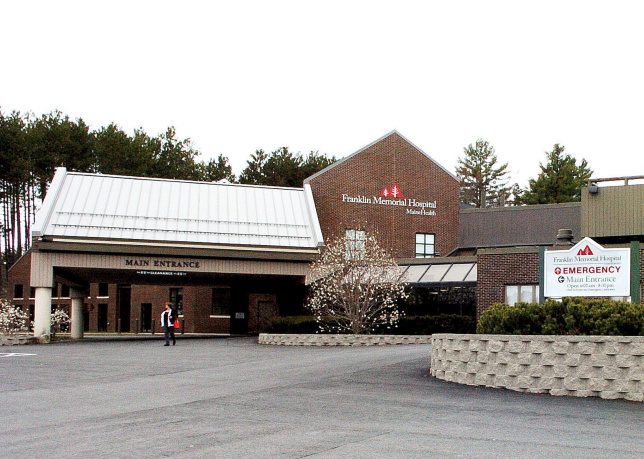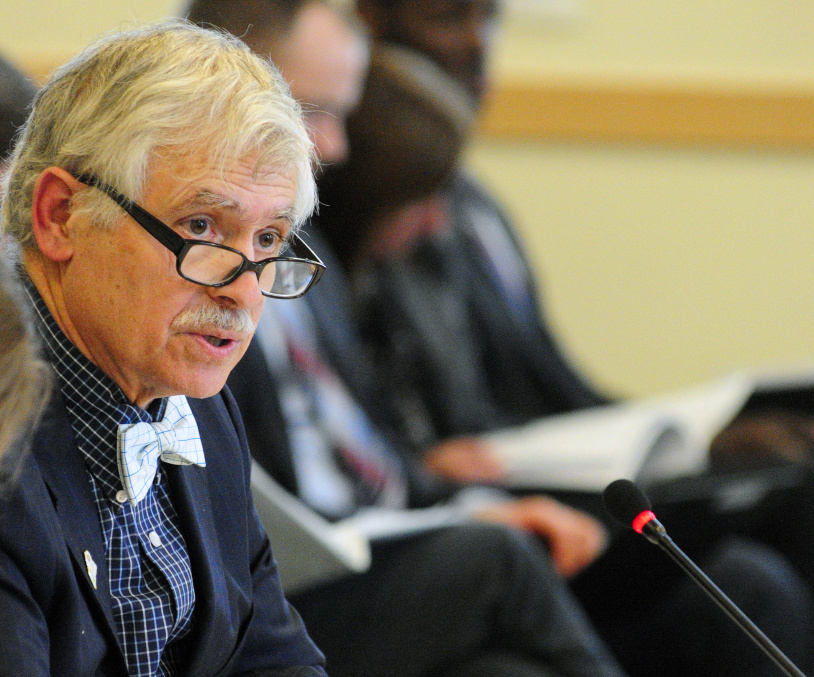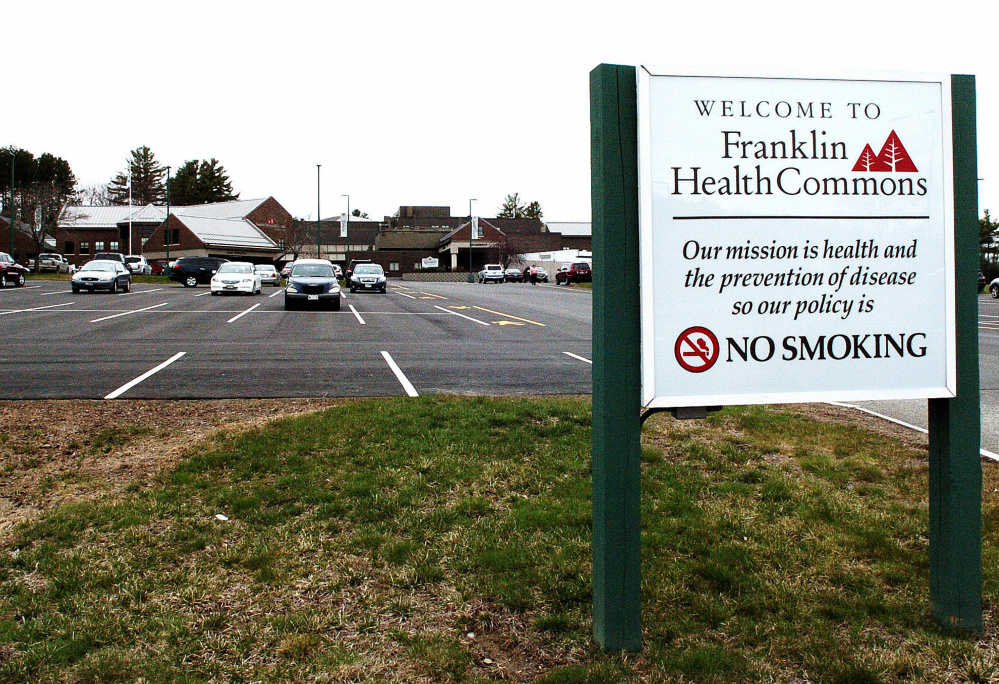Some layoffs at the company that runs Franklin Memorial Hospital in Farmington could have been prevented if lawmakers had expanded the state’s Medicaid program, the area’s Republican state senator said.
Franklin Community Health Network announced last week that it would eliminate 40 full-time positions, including 22 layoffs and vacant positions.
Sen. Tom Saviello, R-Wilton, said one of his biggest disappointments following the end of the 127th legislative session on Friday was the failure to expand the state’s Medicaid program, MaineCare.
“I do believe had we expanded MaineCare, some of these layoffs could’ve been prevented,” Saviello said.
The hospital system’s staffing reductions, which were paired with reductions in services offered by the organization, are part of a cost reduction plan that is estimated to save the network $4.5 million annually. The plan was approved by the FCHN board of directors in an attempt to get the organization into sound financial condition after netting $15 million in losses over the last five years.
Wayne Bennett, chief financial officer of FCHN, said Tuesday that the “most significant” contributing factor to the structural deficit in the organization’s budget is reimbursements from the federal government for Medicare and Medicaid services that do not cover the full cost of providing care in a rural setting, along with the state’s failure to expand Medicaid under the federal Affordable Care Act.
Because of the state’s failure to expand MaineCare, Bennett said, the number of uninsured patients they treat has gone up slightly, contributing to a loss of revenue by forcing the hospital to provide “charity care.”
FCHN also is concerned that the failure to expand MaineCare is causing an increase in the number of people who do not seek care or treatment because they lack health insurance coverage, harming their health and also lessening the number of patients FCHN would see, Bennett said.
“Add it all up and it’s a significant impact,” Bennett said.
Maine is one of 19 states that have not expanded their Medicaid programs to include all people under the age of 65 whose income is at or below 133 percent of the poverty line. Seventy thousand to 80,000 Mainers who would have gained coverage if the state had expanded MaineCare are uninsured, Saviello said.
Republican Gov. Paul LePage is steadfastly opposed to Medicaid expansion, as are most Republican state legislators, putting Saviello in his party’s minority.
Saviello sponsored a bill this session, L.D. 633, that would have expanded MaineCare, but the bill never made it to a vote before the session ended Friday. While he knew LePage would have vetoed the bill had it made it to his desk, Saviello is more frustrated with the fact that the Legislature tabled the bill for ideological reasons instead of bringing it to a vote.
“I knew where the governor stood all along,” Saviello said. “The frustration was that I couldn’t even get it to vote off the table … and they wouldn’t even take it off the table because they didn’t want the governor to celebrate when he vetoed the bill, which is a lousy reason.”
Saviello said he plans to reintroduce the bill that would expand MaineCare coverage during the next legislative session, which will begin next January.
“It’s taking care of the people in my district,” he said.
Saviello said as long as the state fails to expand MaineCare, he thinks more announcements like the one made by Franklin Community Health Network last week are bound to happen because of the financial toll the structure of the current Medicare/Medicaid system is taking on hospitals.
“I think I’m right, but hopefully I’m wrong. This is just the tip of the iceberg. This is just the beginning,” Saviello said.
In rural Maine hospitals such as Franklin Memorial, the discrepancy of Medicare reimbursements and the failure of the state to expand Medicaid is becoming more of a problem because of the departure of mills and the disappearance of the private health insurance they provided, according to Jeff Austin, a lobbyist for the Maine Hospital Association. Fewer patients at rural hospitals have the private health insurance that enabled hospitals to make money, he said.
“Rural Maine has challenges and the feds are adding to those challenges,” Austin said.
Under the federal Affordable Care Act, reimbursements for Medicare, the federal health insurance programs that provides coverage for people over 65, were cut in order to fund the expansion of Medicaid. For Maine hospitals, the cut results in a loss of $90 million worth of Medicare reimbursements that they otherwise would have received had the system not been restructured, according to Austin.
Projections for the Franklin health system over 10 years show a loss of $10.9 million in Medicare reimbursements that the hospital would have received had the program’s reimbursements not been cut, Bennett said.
To make up for the cuts in Medicare, the Affordable Care Act expanded Medicaid coverage, bringing people who were formerly ineligible for coverage under the federal and state program into the market. If a state has expanded its Medicaid program, the federal government picks up 100 percent of reimbursement costs through the end of 2016 for people who were not eligible for Medicaid coverage prior to expansion. In 2017, the percentage the federal government picks up will drop to 95 percent, with the state picking up the remaining 5 percent of reimbursement costs. By 2020, the federal reimbursement rate will settle at 90 percent, with the state picking up 10 percent of costs.
However, because of a 2012 U.S. Supreme Court ruling that upheld a majority of the Affordable Care Act, states are not required to expand their Medicaid program, but their Medicare reimbursements still will be cut.
Austin said that while expansion of Medicaid programs would not result in an even recovery of reimbursements lost by hospitals through the Medicare cuts, it would be a “wash.”
“Because (Medicaid) coverage wasn’t expanded here, we only saw the decrease in Medicare reimbursements,” Bennett said.
Austin said he can’t speak for specific hospitals, but for Maine hospitals as a whole, operating under the Affordable Care Act without the expansion of MaineCare is “clearly a factor and the financial hardships of hospitals.”
Currently 40 percent of Maine hospitals are operating at a deficit, Austin said, adding that most hospitals in the state operate around a 1 percent margin.
Since the cost of care for Medicare- and Medicaid-covered treatment is set by the federal government, hospitals are left to try to make up the difference in cost of care provided and the reimbursements received from the government in what they charge to private insurance companies for their clients’ coverage. But Austin said that can only make up so much of the revenue lost, leaving hospitals to have to make cuts in other areas, such as operations and staffing.
Lauren Abbate — 861-9252
Twitter: @Lauren_M_Abbate
Send questions/comments to the editors.





Success. Please wait for the page to reload. If the page does not reload within 5 seconds, please refresh the page.
Enter your email and password to access comments.
Hi, to comment on stories you must . This profile is in addition to your subscription and website login.
Already have a commenting profile? .
Invalid username/password.
Please check your email to confirm and complete your registration.
Only subscribers are eligible to post comments. Please subscribe or login first for digital access. Here’s why.
Use the form below to reset your password. When you've submitted your account email, we will send an email with a reset code.